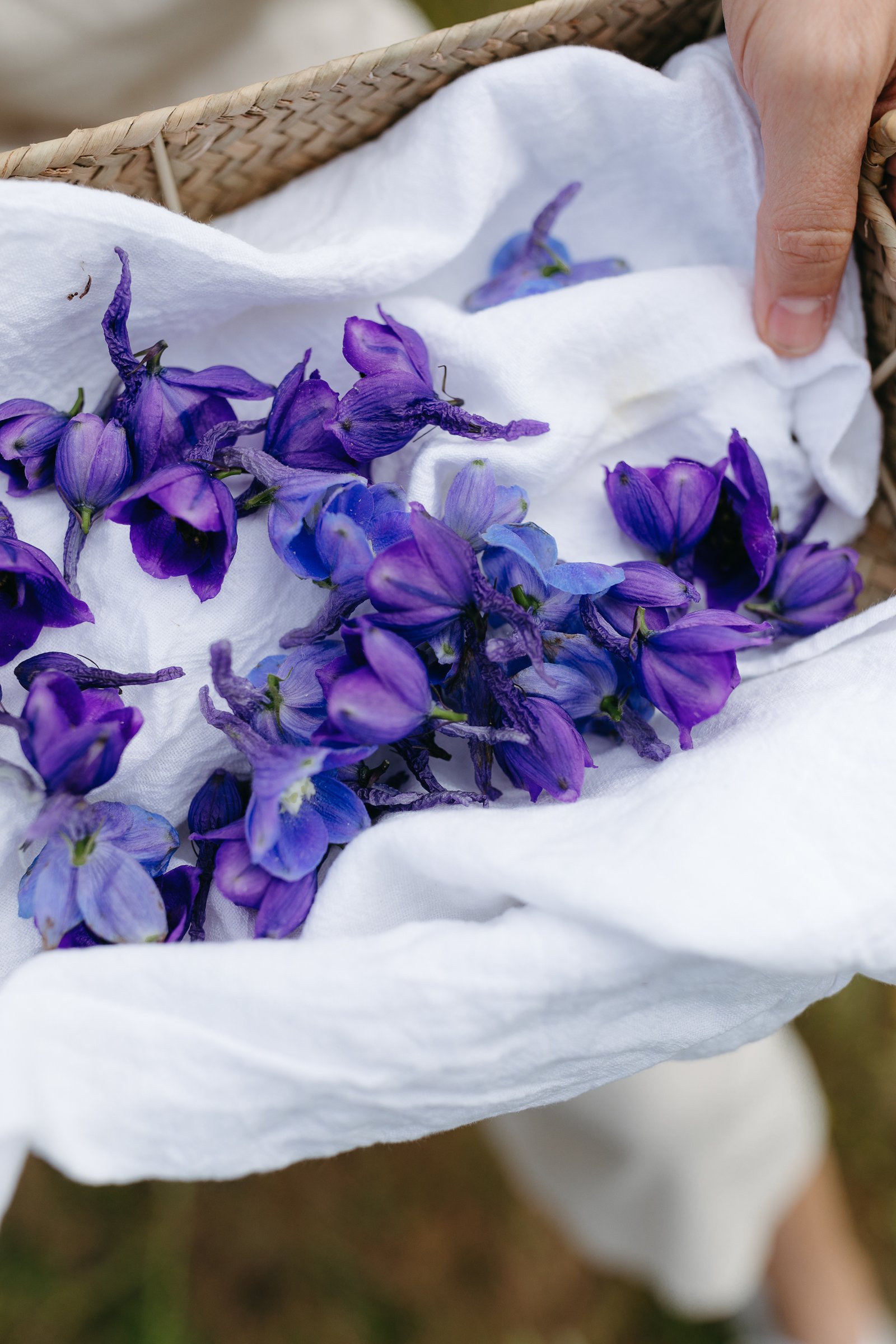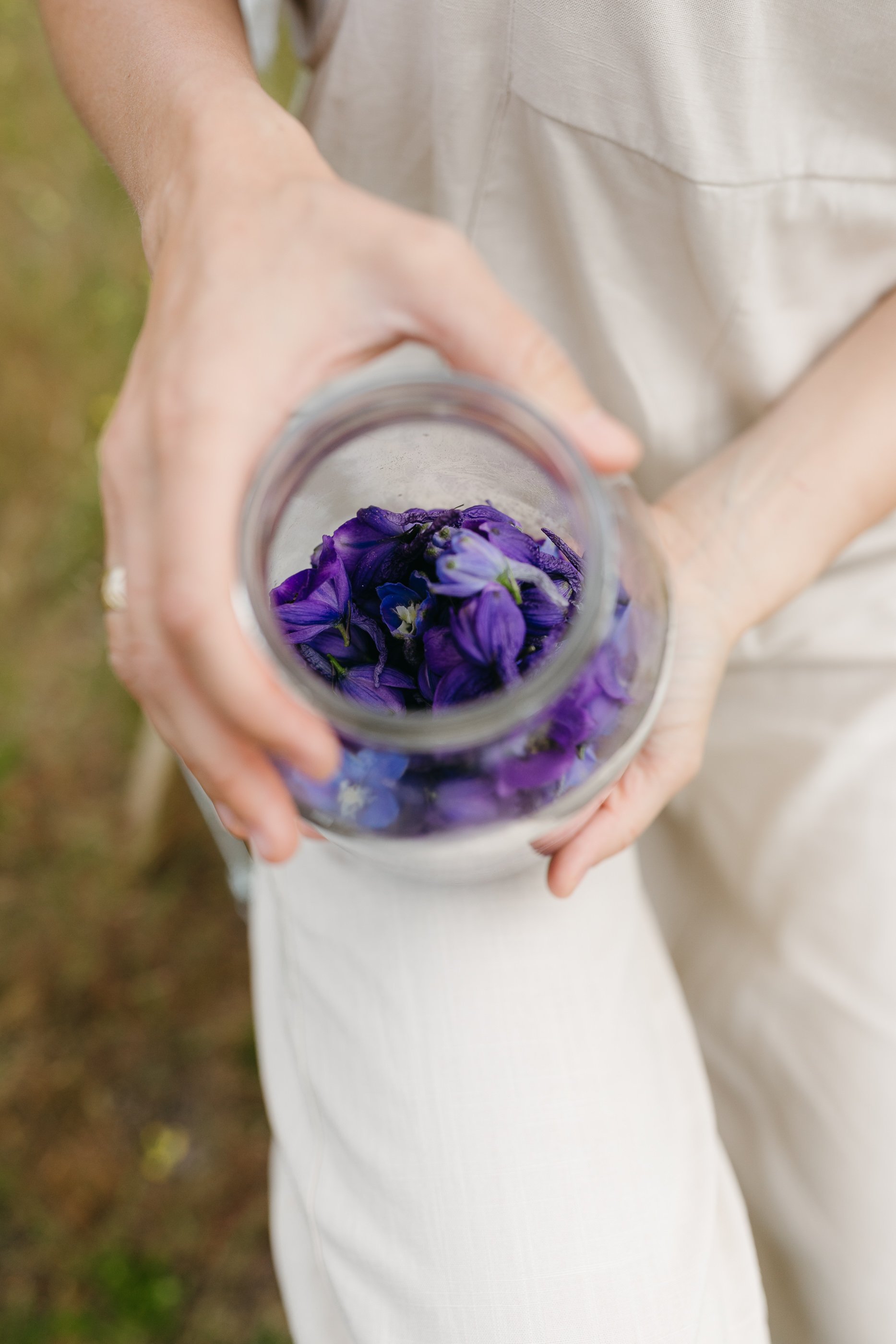Wildflower Clinic’s Top 30 Herbs
The Wildflower Clinic’s in-client apothecary features a blend of eastern and western botanicals used in custom tinctures, teas, decoctions, oils, and powders.
We stock 100% organic herbs and in most cases our herbs are wildcrafted from the Colorado mountains. Below, we’ve compiled our top 30 dispensed medicinal botanicals from our clinic. These herbs are used to address various health presentations and are staples in Eastern medicine. We have created an informational card deck, The Ancient 30, with these 30 herbs to serve as an herbal starter guide or a clinical practitioner guide to harness the therapeutic power of ancient plant medicine. Our card deck features a unique hand-drawn illustration of the plant along with the plant’s Chinese pinyin symbol, clinical actions, indications, parts used, suggested dosage, and a short description about the botanical plant.
We’ve included 3 clinical actions for each herb featured in “The Ancient 30” educational card deck below.
Jujube date (Hong Zao)
Warming
Qi Tonic
Nutritive
Chrysanthemum (Ju Hua)
Diaphoretic
Alterative
Anti-inflammatory
Dong Quai (Dang Gui)
Emmenagogue
Yin Tonic
Blood Tonic
Peony Root (Bai Shao)
Antispasmodic
Anxiolytic
Menstrual harmonizer
Safflower (Hong Hua)
Anti-inflammatory
Anti-bacterial
Analgesic
Jasmine (Mo Li Hua)
Anti-tussive
Anti-inflammatory
Menstrual Harmonizer
Honeysuckle (Jin Yin Hua)
Cooling
Vulnerary
Respiratory Tonic
Reishi Mushroom (Ling Zhi)
Immuno-modulator
Anxiolytic
Anti-inflammatory
Hawthorn Fruit (Shan Zha)
Cardio-tonic
Nutritive
Heart Opener
Orange Peel (Chen Pi)
Spleen Tonic
Bitter Tonic
Nutritive
Shiitake Mushroom (Xiang Gu)
Immuno-modulator
Cardio-tonic
Nutritive
Rehmannia Root (Shu Di Huang)
Cooling
Laxative
Menstrual harmonizer
Fo-Ti (He Shou Wu)
Antioxidant
Anti- inflammatory
Kidney Tonic
Red Sage (Dan Shen)
Cardio Tonic
Analgesic
Blood Tonic
Codonopsis (Dang Shen)
Hepatoprotective
Spleen Tonic
Qi Tonic
Astragalus (Huang Qi)
Nervine Trophorestorative
Immuno-modulator
Qi Tonic
Chinese Skullcap (Huang Qin)
Antioxidant
Mild Sedative
Anti-allergic
Forsythia Root (Lian Qiao)
Alterative
Diaphoretic
Anti-inflammatory
Eleuthero Root (Ci Wu Jia)
Adaptogenic
Circulatory Stimulant
Spleen Tonic
Cinnamon (Rou Gui)
Demulcent
Warming
Antioxidant
Ginger (Sheng Jiang)
Circulatory Stimulant
Bitter Tonic
Vulnerary
Anise (Ba Jiao)
Aromatic
Carminative
Diuretic
Atractylodes (Ba Zhu)
Antitussive
Immuno-modulator
Spleen Tonic
Bupleurum (Chai Hu)
Hepatoprotective
Diaphoretic
Antitussive
Panax Ginseng (Ren Shen)
Adaptogenic
Immuno-modulator
Qi Tonic
Licorice Root (Gan Cao)
Adrenal tonic
Antacid
Demulcent
Cordyceps (Chong Cao)
Wisdom Remedy
Circulatory Stimulant
Kidney Tonic
Goji Berry (Gou Qi)
Warming
Blood Tonic
Qi Tonic
Lotus Seed (Lian Zi)
Nervine Relaxant
Nervine Trophorestorative
Anti-depressant
Shisandra (Wu Wei Zi)
Adaptogenic
Wisdom Remedy
Circulatory stimulant
Clinical Action Dictionary
Warming- ability to warm the interior
Qi Tonic- ability to improve vital force and overall immunity
Nutritive- ability to provide minerals and vitamins to the system
Diaphoretic- ability to promote sweating and removal of toxins
Alterative- ability to cleanse the blood and nourish the liver
Anti-inflammatory- ability to reduce systemic inflammation in the system
Emmenagogue- ability to bring on blood flow (usually specific to the menses)
Yin Tonic- ability to harmonize body fluids and provide moisture
Blood Tonic- ability to nourish the blood and help the system to utilize nutrients
Antispasmodic- ability to reduce spasms of the smooth muscle tissue
Anxiolytic- ability to reduce anxiety and calm the central nervous system
Circulatory Stimulant- ability to increase blood flow and circulation to the organs and tissues
Antibacterial- ability to ward off bacterial infections
Analgesic- ability to reduce pain in the system
Spleen Tonic- ability to build digestive fire, “agni” and strengthen the blood
Immuno-modulator- ability to promote homeostasis of the immune system
Hepatoprotective- ability to protect the liver from damage
Cardio-tonic- ability to strengthen and harmonize the cardiac tone and rhythm
Nervine Relaxant- ability to relax the central nervous system
Nervine Trophorestorative- ability to harmonize and strengthen the central nervous system
Anti-depressant- ability to provide support against depression by strengthening neurotransmitters
Cooling- ability to cool the interior
Adaptogenic- ability to help the body respond better to stress (note: adaptogens are a dangerous herb class, only work with a qualified herbalist when using adaptogens to prevent adrenal burnout)
Wisdom Remedy- ability to affect the shen spirit or “spirit” of the system to promote connection
Antitussive- ability to reduce or relieve coughing
Mild Sedative- ability to slightly sedate the system (note: there are many classes of sedative herbs, use caution)
Antioxidant- ability to guard against fee radical damage in the system
Anti-allergic- ability to stabilize mast cells and calm an overactive immune system (ex: hypersensitivity)
Adrenal Tonic- ability to support natural energy levels and cognitive function
Antacid- ability to neutralize stomach acid and relieve symptoms of heartburn or indigestion
Demulcent- ability to provide moisture to the tissues and organs
Menstrual harmonizer- ability to harmonize the menses cycle in line with the Infradian rhythm
Vulnerary- ability to address wounds in the Gastrointestinal tract (ex: leaky gut syndrome)
Respiratory Tonic- ability to strengthen the lungs and normal breathing cycles
Aromatic- ability to provide natural fragrance that positively alters the senses
Carminative- ability to relieve flatulence (gas) and abdominal pain
Diuretic- ability to increase the amount of urine
Kidney Tonic- ability to support blood filtration and the “Jing” essence (vitality of life)
Heart Opener- ability to positively influence the heart-mind relationship
Laxative- ability to increase or stimulate bowel movements (ex: constipation)







